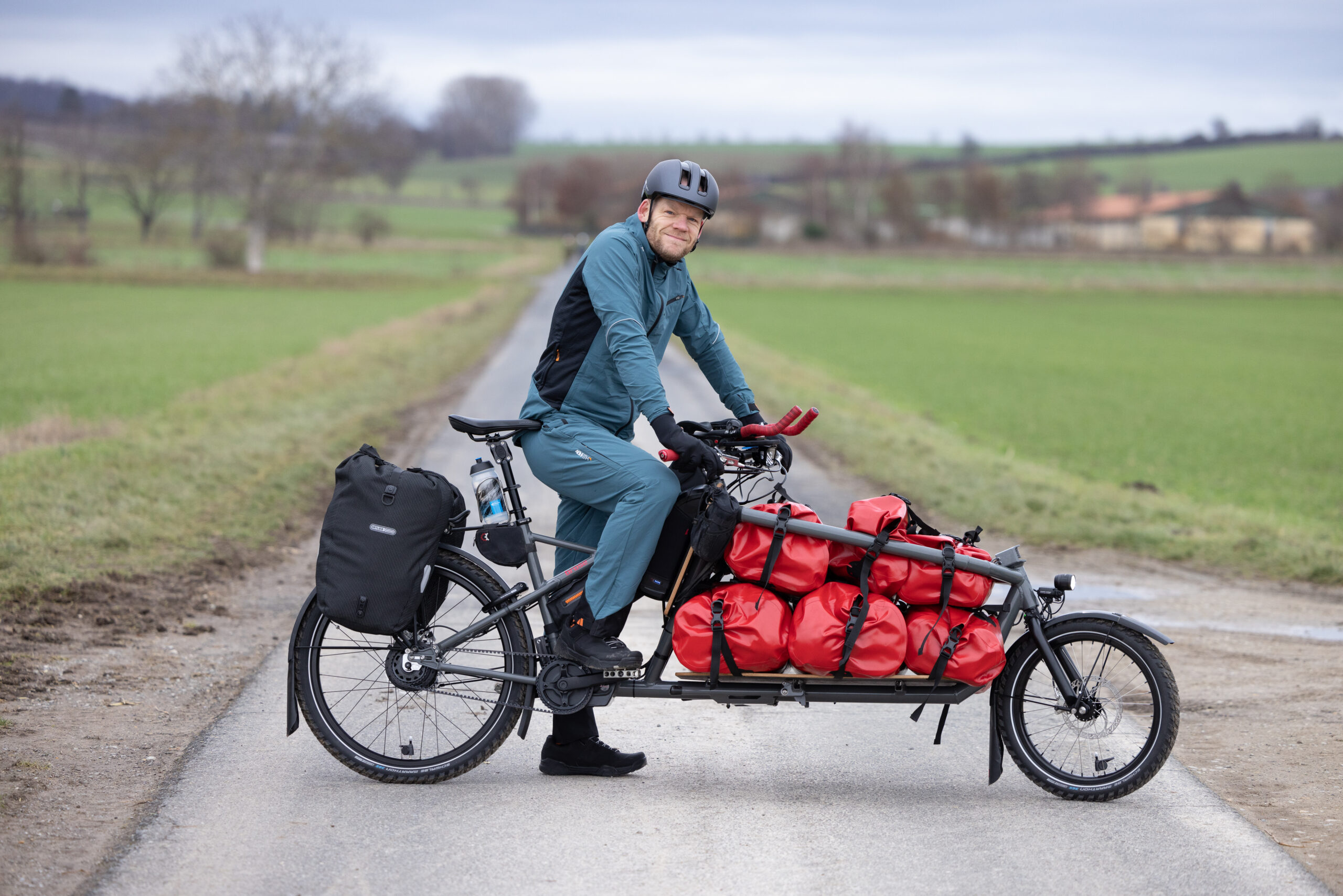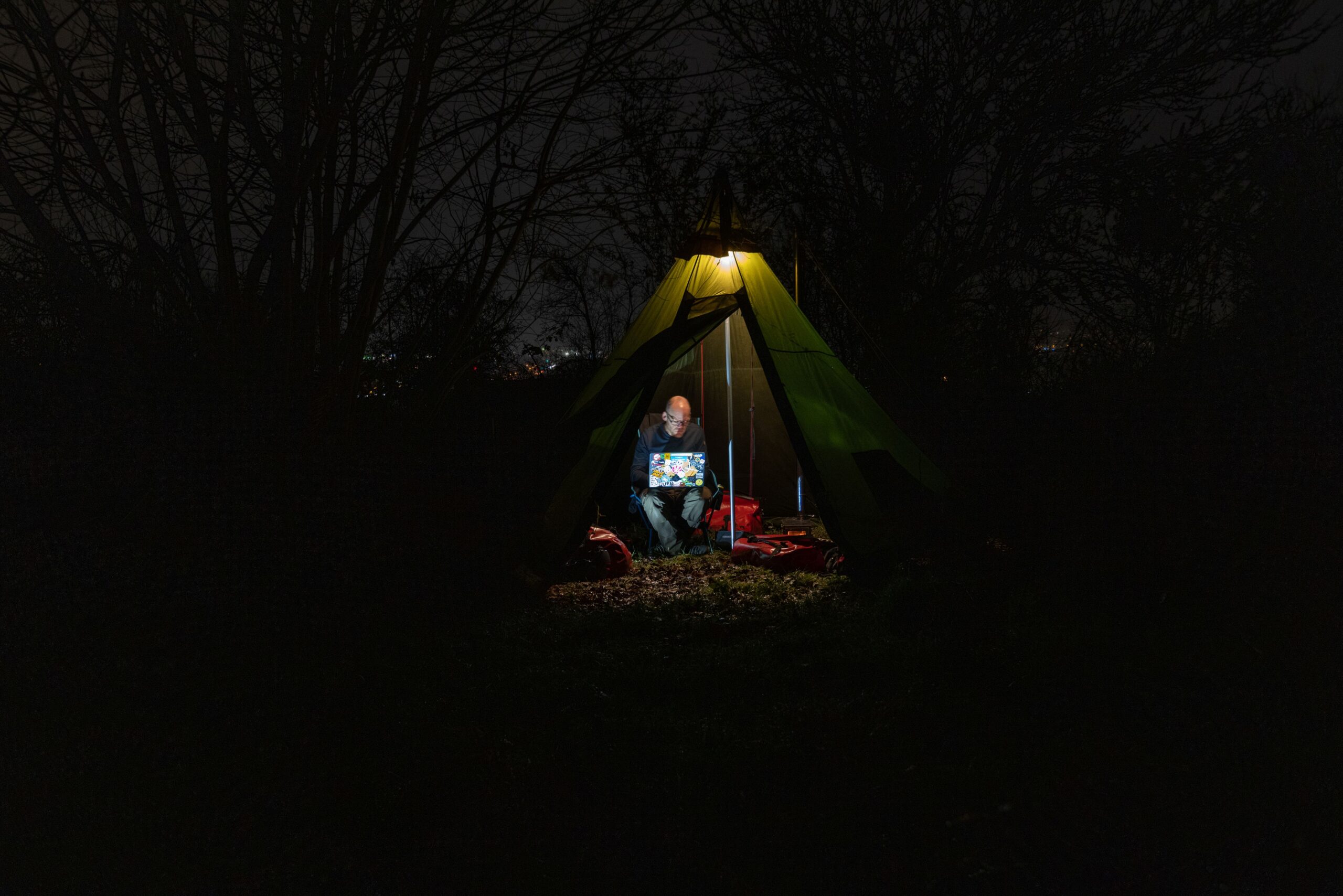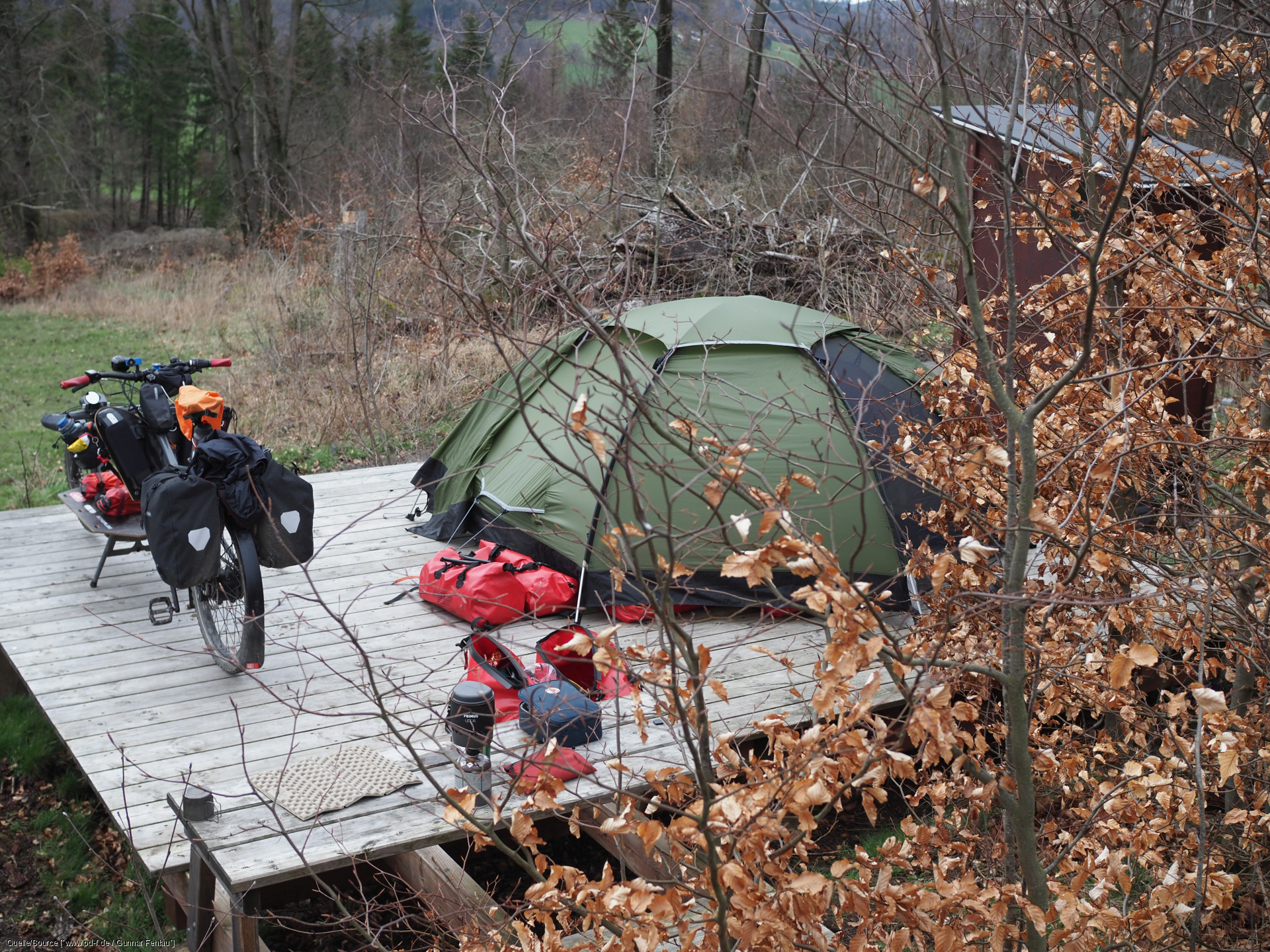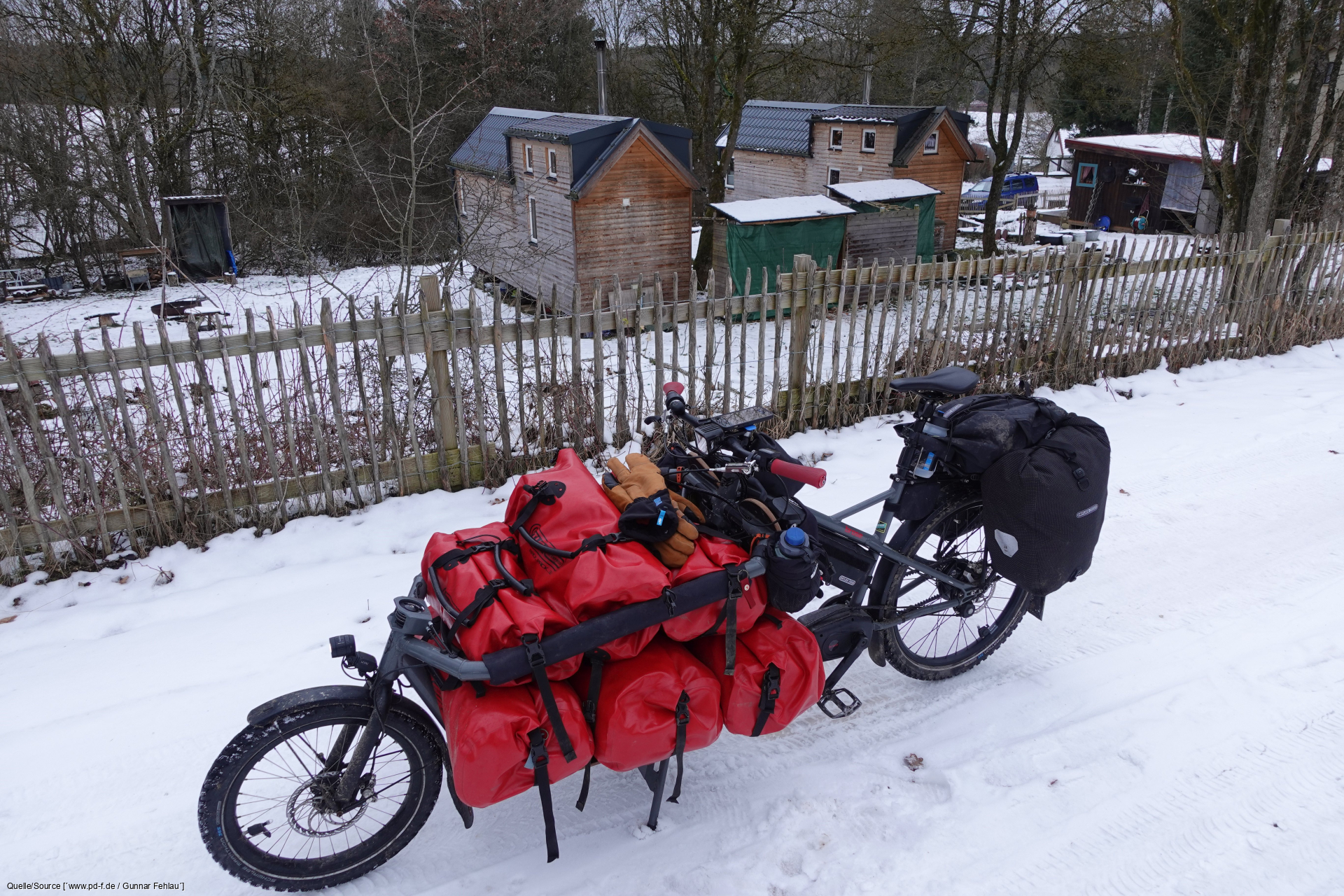I have known German velopreneur Gunnar Fehlau for a few years now. Gunnar’s base in Göttingen was only an hour’s bike ride away from the village where I grew up from my mid teens onwards. He has been a driving force behind developing bikepacking events in Germany, so in 2016 we went on a bivvy a few years back in the middle of winter, and Gunnar definitely won the coffee in the morning competition. With foresight he had already arranged all things needed for the first cup of coffee within an arm’s length of reach around him, while I had to get out of my warm sleeping bag trying to find a stove and cup for the coffee.
When Gunnar set off on his ‘workpacking’ trip on 2 January I got curious, and arranged an interview to get to know more about his trip.
Who is Gunnar Fehlau?
Gunnar describes himself as a velo nerd: ‘The only thing I can do is talk and ride bikes.’
He is the owner of Pressedienst Fahrrad, a media service which provides a link between the media world and the world of cycling, one of the editors of Fahrstil magazine, a bike culture magazine, the founder of the Grenzsteintrophy, probably the first European self-support ride or race following the former German border along the Iron Curtain Trail, and also founded the Candy B Graveller, one of the newer bikepacking gravel rides in Germany. And most recently he started the Boot Camp Bike, an online study course for newbies in the bicycle business, where people get to know all he learned about bikes in his 30 years in the industry in 40 lessons in a compact online course.

What is workpacking?
On 2 January 2023 Gunnar started a new adventure – workpacking. Broadly speaking it is the combination of bikepacking and work and travel: ‘It’s the van life without a van.’
It’s not supposed to be a lifestyle he will continue until the end of his life. It’s one year off, doing something different: ‘Think about if you are 20 years old and just past your Abitur (GCSEs), and you tell your community I will go for work and travel for a year. Everybody will say yeah, that’s good. You just ended a part of your life, the new has started. You will never know when you get enough time and freedom, just go. But if you’re 50 and you tell the people the same story, everybody thinks you are a weird guy. There’s nothing weird about it. To me it’s pretty normal I would say.’
What does he pack?
‘Think about your own flat or house. There are some rooms: you got a sleeping room, you got a bathroom, you got a kitchen, you got whatever. And I have to convert all that stuff to bring it on my bike.’
Gunnar carries his belongings for the trip in eight bags on his electric cargo bike: six Ortlieb rack packs in the front of his and two panniers in the rear. One bag holds his ‘whole’ flat – his tent. The next bag is the bedroom: mat and sleeping bags. Next up is the bathroom, and then the office: laptop and all the other stuff needed for running his company remotely. The next two bags are crucial to feed himself: kitchen and storage room with all the food. Then there is a bag for all his clothes and his cycling stuff. And the eighth room is his workshop: technical gear and tools he doesn’t necessarily need day by day. Starting with about 56 kilograms of gear, he has now cut it down to 42; his iconic looking tipi with a titanium tent oven setup had to make way for a regular dome tent from Fjallraven, and all of his warm winter gear isn’t needed at the moment as well.

What does workpacking look like day by day?
Every day is different. For Gunnar there is no usual anymore. That is probably the most adventurous part of it. There is no routine, no structure, and one of the big surprises of the tour is the hospitality of the people. People invite him to pitch his tent, and as most of them are cyclists themselves, they know what to provide: ‘They always have three questions: does your bike need any service, do you want to have a shower and any clothes to wash? So they know what the cyclist needs on the road. I have never entered a laundrette so far.’
There is no strict distinction between work and adventure on Gunnar’s trip. Although he has a rough structure, six days a week with six hours working and riding his bike for about 50k, he has not had a single day in being on the road for 90 days where this has exactly worked out. For him the trip is proof that work and adventures are not mutually exclusive, they can co-exist well together: ‘The hypothesis for the whole thing is: I am doing this instead of doing my work everyday and then from time to time I free up spaces for adventures. Other people might be thinking about travelling around the world when they are retired. But in the meantime you get ill, so you work your whole life and you don’t get the reward. I don’t know yet if this is a good idea or if this will be the most stupid thing I’ve ever done, because I don’t have a feeling of routine so far. Every day is new, and you can’t put them together.’

An idea born on short notice
Gunnar first had the idea for his trip in August 2022. He started to talk about it with his family in September, and by October he had sponsors lined up for his trip – Brose for the bike, Globetrotter, a big German outdoor shop chain for equipment, Ortlieb for bags, ABUS for keeping everything safe and Schwalbe to keep him rolling. But with delays in supply chains, his first ride on the bike was on 23 December at 6pm, the last proper working day of the year. And six days later, on 29 December, he tested the bike setup with all the gear. In an ideal world he would have started his trip in October, but waiting until October 2023 was out of discussion, he wanted to get rolling sooner: ‘I will turn 50 this year, so I will be on the road for 50 weeks. On the 20/21 December I will be back home. There is no necessity to sit alone in the camp somewhere alone at Christmas time, while the family is meeting at home. The tour is not about punishment and it’s not about results.’
There is a common German phrase that perfectly sums up Gunnar’s workpacking adventure: ‘Erlebnis statt Ergebnis.’ Experience instead of result. It’s about getting cycling and working in a new balance for a year.

More information about Gunnar Fehlau and his workpacking adventure can be found on workpacking.de.
Did you know that Yellow Jersey insure all types of bicycle, including cargo bikes? Click here for a cargo bike insurance quote